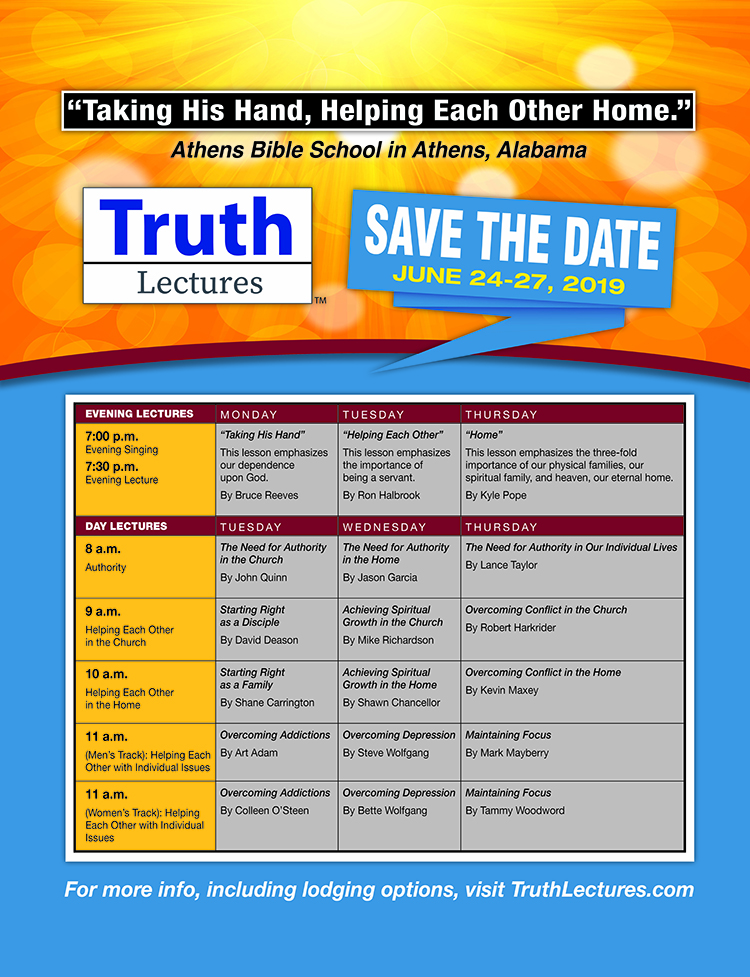

by Allen Dvorak
Synopsis: Serving others is required for greatness in the kingdom and involves selflessness, sacrifice, and humility.
During His public ministry, Jesus taught His chosen disciples many things about being citizens of the coming kingdom, but it seems that they had difficulty with one basic concept—the nature of greatness in the kingdom.
On one occasion, Jesus and the twelve passed through Galilee from the mount of transfiguration to the city of Capernaum. On the way, the twelve argued among themselves. When they reached the house in Capernaum, Jesus asked them about the subject of their discussion. Perhaps embarrassed, they didn't answer because they had been arguing about who would be the greatest in the kingdom (Mark 9:33-37). Jesus answered their question for them: "If anyone would be first, he must be last of all and servant of all" (v. 35). It is probable that His answer surprised them!
However, that wasn't the end of the matter. As Jesus traveled to Jerusalem with His disciples for the last time, the mother of James and John brought her two sons to Jesus and requested a favor from Him. She wanted her sons to sit closest to Him, on His right hand, and His left hand, in the kingdom, i.e., she wanted her sons to have positions of honor in the coming kingdom (Matt. 20:20-28). When the other ten apostles heard of the request, they were indignant with James and John who were apparently behind their mother's request. Likely, the other apostles were upset that the sons of Zebedee had "beaten them to the punch!" Mark's parallel account shows that Jesus used the occasion to emphasize to the apostles how their relationship to one another was to differ from the way that "the rulers of the Gentiles" lorded it over their citizens. "Whoever would be great among you must be your servant, and whoever would be first among you must be slave of all" (Mark 10:43-44). In that way, they would be like their Master who "came not to be served but to serve, and to give his life as a ransom for many" (v. 45).
During the passion week, Jesus pronounced several woes against the scribes and Pharisees (Matt. 23). He described them as loving the attention of others and seeking honor for themselves. In contrast, Jesus instructed the disciples not to seek titles/accolades that elevated them above their fellows. He said, "The greatest among you shall be your servant. Whoever exalts himself will be humbled, and whoever humbles himself will be exalted" (vv. 11-12).
A few days later, Jesus observed the Passover with His apostles on the night of His betrayal. In the previous weeks, Jesus had informed the apostles of the events soon to transpire—His betrayal to the Jewish leaders, His death at the hands of the Gentiles and His subsequent resurrection (Matt. 20:17-19). The mood at the supper appears to have been somber. Jesus informed the apostles that one of them would betray Him (Luke 22:14-23). It is amazing that, in these circumstances, the apostles once again disputed among themselves "as to which of them was to be regarded as the greatest" (Luke 22:24)!
John's gospel doesn't record this Passover observance, but tells the story of Jesus washing the apostles' feet on that same night (John 13). The apostles' surprise at His action is seen in Peter's initial refusal to allow his feet to be washed (v. 8). That was a task usually reserved for servants or slaves—not appropriate for the Master! I suspect that Jesus' actions were prompted by the continuing competition among the apostles to be considered the "greatest" in the kingdom. When He had finished washing their feet, Jesus said to them,
Do you understand what I have done to you? You call me Teacher and Lord, and you are right, for so I am. If I then, your Lord and Teacher, have washed your feet, you also ought to wash one another's feet. For I have given you an example, that you also should do just as I have done to you. Truly, truly, I say to you, a servant is not greater than his master, nor is a messenger greater than the one who sent him (John 13:12-16, ESV).
It certainly seems that the apostles were slow to learn the lesson of greatness in the kingdom. Yet, perhaps we shouldn't judge them too harshly; it seems that disciples today sometimes have trouble with the same principle. In the business world, the person who climbs the corporate ladder to a position of authority over many people is considered a success. Although we definitely can find public examples of people who serve others, common opinion in our culture is that serving someone else is humiliating or degrading. "I want to be served, not to serve." In contrast, as kingdom citizens, we need to use what God has given us to serve others, "as good stewards of God's varied grace" (1 Peter 4:10, ESV).
Every moment of time, every ounce of energy, every cent spent in the service of another is just that much that cannot be spent on oneself. Those committed to serving others have decided to put the needs of others before their own. I am not suggesting that disciples must neglect themselves, but Paul (the Holy Spirit!) said it well, "Let each of you look not only to his own interests, but also to the interests of others" (Phil. 2:4).
The planned evening at home may end up being a visit to the hospital or taking food to someone who is sick. A Saturday off from work may turn into a day of work for someone unable to do yard work. A shopping trip may have to be postponed in order to babysit the young children of a harried mother, or one who is sick. Instead of several relaxing hours at one's favorite hobby, it may be that a troubled marriage needs immediate help in the form of counsel.
Serving others is often inconvenient. It doesn't just cut into the time, energy and money that we might expend upon ourselves, but we often have to "extend" ourselves. In the scene of the final judgment pictured by Jesus, the "sheep" are commended for having provided food, drink, hospitality and clothing to the Lord and for having visited Him when sick and in prison (Matt. 25:31-36). Providing for the physical needs of others consumes time and assets. We must remember, however, that when we serve others, we are also serving the Lord (vv. 37-40).
Someone has said that the most difficult instrument to play in the orchestra is second fiddle. Everyone wants to be "first chair" (just like the apostles during Jesus' public ministry). Yet, service to others means accepting the role of a servant. Because the proud man finds it difficult to serve others, the Scriptures often link the concepts of service and humility (e.g., Phil. 2:3-8; Matt. 23:11-12). Jesus "emptied himself" and took the form of a servant to provide salvation for mankind.
These three facts about serving others also apply to our service to God; serving one another is simply one aspect of our service to Him. Let us be resolved to serve one another. There are innumerable ways that we can show our love for others by serving them. If it becomes known that we are willing to serve, it may not be necessary to look for opportunities; opportunities will find us!
Author Bio: Allen has worked with the Kelly Spring Road congregation in Harvest, AL for twelve years. He and his wife, Debbie, have two married sons and four wonderful grandchildren. The church website is spreadingtruth.org. He can be reached at allen.dvorak@reagan.com.
